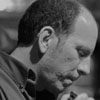The Rudy Moment
by Ken Ficara
Originally published in Bob Howe's Fetish Weather Forecast, February 8, 1999
An autopsy yesterday found that [Amadou Diallo] suffered 19 gunshot wounds: 1 to the front of the chest, 5 to the left side, 1 to the left back, 1 to the right arm and 11 in the legs. Internal injuries -- ruptures of the aorta, spinal cord, lungs, liver, spleen, kidney and intestines -- caused his death, said Ellen Borakove, a spokeswoman for the Medical Examiner's office.-- The New York Times, describing the results of a 41-shot police barrage.
While it may seem to a layman to be excessive, it was the number required before this man stopped. All 41 shots did not hit this individual.-- Stephen Worth, a police union lawyer representing the cops in the shooting.
For the FWF readers who don't live in New York City, the story is this: Four police officers from an elite undercover unit killed 22-year-old Amadou Diallo, a religious Muslim immigrant from Guinea who had never been in trouble in his life, in a fusillade of 41 shots in the doorway of his Bronx apartment building. There's been no official explanation of what happened, but Diallo did not have a weapon and has not been accused of any crime.
That's quite a Rudy Moment. Here's another one:
RAPPER IN SHOOTOUT
OL' DIRTY BUSTED
IN COP CHASE - POLICE
blared the New York Daily News on January 16, 1999. Rapper Russell Jones, a member of the Staten-Island-based rap supergroup Wu Tang Clan who performs as "Ol' Dirty Bastard," had been pulled over in Queens by plainclothes cops in an unmarked car for driving with his headlights off. He pulled a gun, fired at the cops, and they fired back. He was charged with attempted murder.
Much wailing and gnashing of teeth about rap and its encouragement of violence among black youth ensues. A month later, the story changes. The case is thrown out. Chemical tests on his hands proved he hadn't fired a gun. No gun was found at the scene. The only shots fired at the scene were fired by cops. The whole story was a complete pack of lies.
"There was not a scintilla of evidence to support what the cops said," his lawyer said. "You go from looking at a life sentence to 'Sorry.'"
Well, you do if you can afford a good lawyer, anyway. So far, there's been no word about any disciplinary action against the cops involved. The major city papers aren't asking how many people are in jail now thanks to similar police fabrications. The guardians of public morals aren't raising the issue of the violent image of police officers and the message it sends to the youth of Bensonhurst and Staten Island. Or for that matter, the message it sends to other cops, like the ones who slaughtered Diallo.
While police brutality and racism certainly aren't unique to New York City or Mayor Giuliani's administration, he should be held especially responsible for the way police treat African Americans and Latinos here.
Rudy Giuliani has long been a proponent of the "broken windows" theory of municipal government: that fixing the small things when they go wrong leads to an overall change in attitude and a resulting correction of larger problems. This was the logic behind his assault on squeegee men and on low-level crimes like public drinking, fare beating, and so on. The effectiveness of that strategy has been pretty much proven, but he chooses to use almost its exact opposite when it comes to police brutality.
When discussing police crimes, he sounds more like the liberals he despises: He's got an excuse for everything, the cops should be given the benefit of the doubt, they have a hard job, and we should all feel bad for the poor cops trying to do their jobs.
What he apparently doesn't recognize is that these brutal maniacs on the force are making it harder for the good cops to do their jobs. Can you imagine what it must be like to try to be a good cop, caught between a civilian population that hates and fears you, and violent colleagues who know they can get away with whatever they like?
But Giuliani's support of police brutality goes beyond tacit condoning of the crime to active hostility towards those who try to combat it. Remember that he participated in a violent, racially-tinged police riot (of the kind Khalid Muhammad could only dream of having) in front of City Hall during his election campaign in 1993, to protest then-Mayor Dinkins' institution of the Civilian Complaint Review Board. He has been unrelentingly dismissive of that body's activity during his time as Mayor, rejected out of hand the mild recommendations of a task force on police brutality that he himself created, and otherwise has sent a very clear message to the police: Do what you want, but hey guys, let's try to keep it out of the papers.
His quality-of-life campaign has resulted in a more-than-50% increase in civilian complaints against the police. The common excuse for this increase is that increased enforcement leads to increased arrests leads to increased opportunities for complaint. But the numbers don't bear that out: Until 1995, 88% of the complainants had neither been arrested nor ticketed. "It would appear that many of the people filing complaints are not engaged in criminal conduct," says Human Rights Watch, "But that 'aggressive' policing may involve the harassing and questioning of individuals who later file complaints." The CCRB stopped giving out those figures after 1995. [Source: Shielded From Justice: Police Brutality And Accountability In The United States, report by Human Rights Watch June 1998]
It's not too far a stretch to say that Amadou Diallo died for your quality of life; that he's dead today because too many New Yorkers support a drop in crime no matter what the cost. If we had all insisted that combating crime can and should be done with respect for everyone in New York City, he might be alive today.
"The Rudy Moment" became a semi-regular FWF feature. Below are are a few more:
- January 20, 1999
- And there was a Rudy Moment: I slip-slide to the front door of Port
Authority and
get inside (phew!) and head towards the subway. A cop stops me.
"Where's your bus ticket?"
What bus ticket? I'm getting on the subway.
"You have to have a bus ticket to come in. Get the train at 40th Street."
Back out onto the ice, thinking, well, it's a mild inconvenience for
me, but at least homeless people are freezing to death rather than
inconveniencing bus passengers.
- February 1, 1999
-
The Mayor made major strides over the last week or so in his
continuing quest to achieve the same national recognition and respect
accorded luminaries such as Ken Starr and Linda Tripp.
As if New York City didn't already have enough of a national reputation for arrogance, he scolded the state of Virginia, and by implication the rest of the United States, for being unwilling to bury tons of New York City trash in its landfills. Hey, he said, we are such a great cultural resource that taking our trash is the least you could do!
Of course! Why didn't we think of that? For that matter, you should not only take our trash, you should do our laundry, walk our dogs, and wash our windshields. Oh wait, no, don't wash windshields. The mayor hates that.
- March 30, 1999: Rudy gets a 2 1/2-year jump on today's security paranoia
- The New York Times on Sunday had a typical article about an
unanticipated side-effect of Rudy Giuliani's decision to turn City
Hall into an armed bunker and City Hall Park into a construction site.
Some background, especially for FWF readers who have never been to the area, or haven't been lately: New York's City Hall sits on the north side of a triangular park. The triangle points South and is bounded by Broadway on the west, Park Row (formerly the headquarters of all the city's newspapers) on the east, and City Hall itself on the north.
Directly in front of City Hall is the parking lot. Once upon a time, you were free to walk back and forth around the building and even to go listen to the many impromptu news conferences that were held on its steps. You could even go inside -- imagine! -- and see the City Council in action or go to a committee hearing. This unfettered public access to government disturbed Rudy, who views citizen involvement in government with about as much enthusiasm as Pol Pot viewed college professors planning urban renewal.
So for the last year, City Hall has been surrounded by police-manned barricades. You can't walk through the parking lot without convincing the cop on duty that you have a good reason to be there. ("Because it's a public building paid for by my tax dollars and I want to see my representatives in action" is not a good reason.) The park, which used to be a pleasant place to eat lunch on a nice day, was recently surrounded by a razor-ribboned fence for renovations.
So the Times reported on Sunday that this situation, which essentially creates a four- or five-block long barricade separating the east side of the area from the west, has seriously hurt business in stores on Nassau Street, east of the park. Years ago, these blocks were filled with dozens of stamp dealers that I remember visiting with my grandfather as a child, but now they're gone, mostly replaced by small clothing stores, electronics and beeper stores, and takeout restaurants. A good chunk of their business was business people and lawyers from the buildings on Broadway and west (where there are fewer places to eat) walking across the park for a quick lunch, maybe eating it in the park. Now that it's closed and it's impossible to walk across it, those people are gone, and several stores have closed.
So far, good for the Times for finding this problem and writing about it. But they fell flat on their face in a typical fashion: The merchants are begging the city to open a passageway across the park to let their customers come back. The Times then quotes a Giuliani flack's response: "It's a safety issue. This is a construction site." They left the glaringly obvious question unasked: Why not reopen the parking lot? It's not under construction, and would provide a perfect pathway for people to cross the park.
Of course, the issue may simply be that the mayor regards citizen access to government as a safety issue too.

